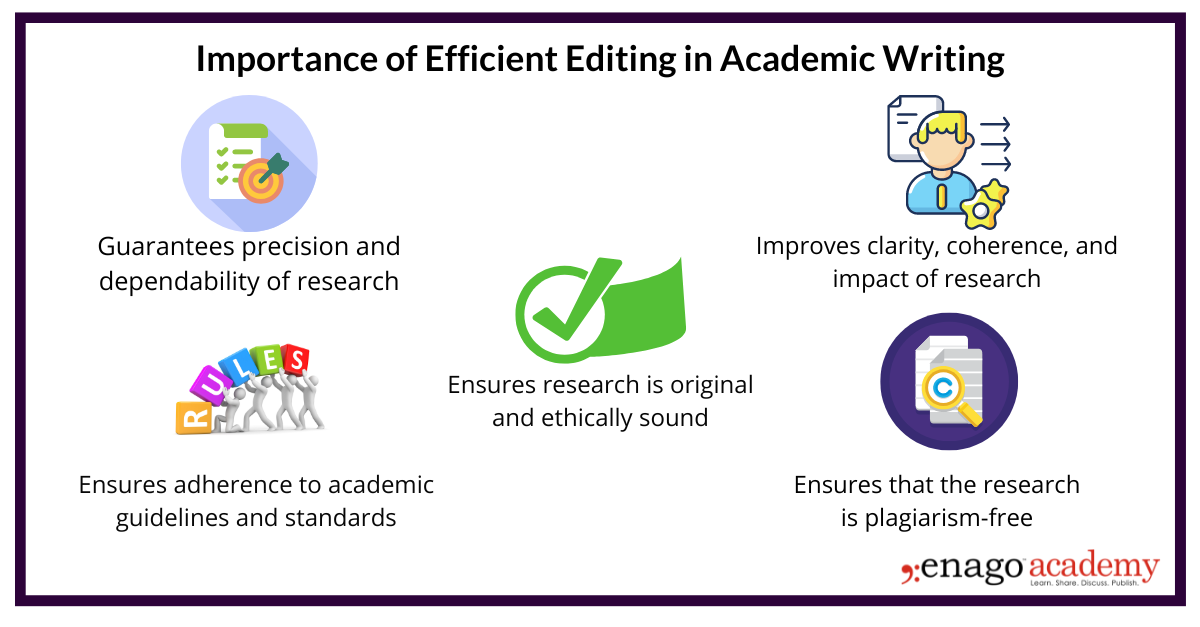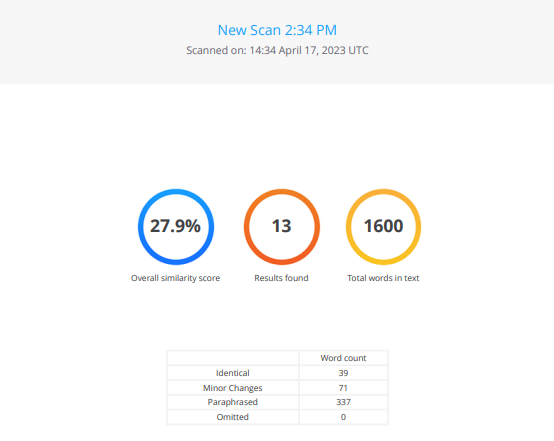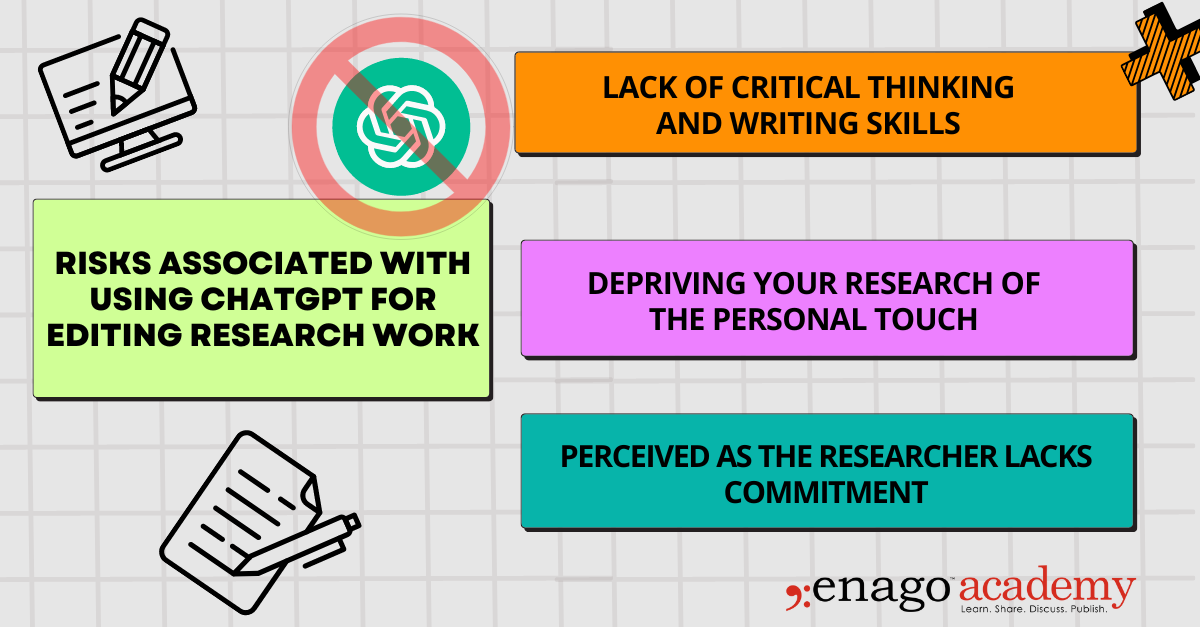The Limitations of ChatGPT: How human editors remain indispensable in academic writing

ChatGPT as an academic editing tool has the power to send your hard-earned reputation on a rollercoaster ride like no other.
Relying on ChatGPT to edit your scholarly work is only a way to inviting turbulence to your smoothly running academic journey. ChatGPT’s utilization as an academic editor guarantees lack of accuracy and reliability, it can introduce inaccuracies and unreliable information into research, it can cast doubt on the researcher’s diligence and commitment to rigorous investigation.
Why Efficient Editing Is Crucial in Academic Research and Scholarly Writing
All reputed journals recommend authors to enlist professional editing assistance for polishing their manuscripts. Why is this so? Because effective editing is an indispensable aspect of academic research and scholarly communication. Efficient editing ensures that the research manuscript is free from errors, inconsistencies, and ambiguities that could otherwise undermine the credibility and clarity of the research. It also ensures that the research is read and understood by a wide and global readership. In essence, editing ensures that the final manuscript is a polished and coherent representation of the research findings.

When conducting research, researchers must pay close attention to the details and be meticulous in their approach. However, even the most rigorous research can still contain errors or inconsistencies that can be missed during the initial writing phase. With thorough editing, it is possible to detect and rectify these mistakes, thereby guaranteeing the precision and dependability of the research.
Moreover, effective editing helps improve the clarity and coherence of the research. A well-written manuscript should be easy to read, understand, and follow. Editing ensures that the research is presented in a logical and consistent manner, with clear and concise language that is appropriate for the intended audience. This not only improves the readability of the manuscript but also enhances its impact, making it more likely to be read and cited by other scholars.
Academic writing is subject to strict guidelines and conventions, and failure to follow these guidelines can result in rejection or low-quality publications. Effective editing ensures that the manuscript is structured and formatted correctly, and that it conforms to the relevant citation and referencing standards of your target publishing platform.
Most importantly, effective editing helps ensure that the research is free from plagiarism. Plagiarism is a serious academic offense that can have severe consequences, including expulsion or loss of reputation. Editing can help to identify any passages that have been copied or paraphrased from other sources, ensuring that the manuscript is original and ethically sound.
3 Immediate Major Pitfalls of Using ChatGPT for Editing Research Work
ChatGPT has potential negative impacts and costs that researchers may face in their academic careers by relying too heavily on it.

ChatGPT-generated text checked on one of the premium plagiarism checkers
1. Risk of Text Plagiarism
One of the primary concerns with using ChatGPT for editing research work is the risk of plagiarism.
Plagiarism is a significant concern in academic research and can have severe consequences for the researcher and their reputation. The risk of unintentional plagiarism increases when relying solely on automated systems such as ChatGPT.
ChatGPT may suggest phrases or sentences that are too similar to existing works, thereby introducing the risk of plagiarism. Despite being trained on vast amounts of data, it may not be able to distinguish between original ideas and those that have already been published. As a result, it may inadvertently suggest phrases or sentences that are too similar to existing works, leading to accidental plagiarism.
On the other hand, human editors have the ability to spot and flag potential plagiarism, reducing the risk for researchers. They are able to identify sections of the research work that may be too similar to existing works, and can work with the researcher to revise the work to ensure that it is original and does not infringe on the work of others.
Human editors can provide guidance and resources to help researchers avoid unintentional plagiarism. They can advise researchers on how to properly cite sources, and can suggest techniques for paraphrasing ideas and concepts in a way that is authentic and unique.
Importantly, human editors can help researchers to understand the ethical and legal implications of plagiarism. They can educate researchers on the importance of integrity in academic research, and the potential consequences of violating copyright and intellectual property laws.
2. Risk of Idea Plagiarism
Idea plagiarism in research is a complex issue that arises when one researcher presents another researcher’s ideas or findings as their own. This practice can lead to a loss of credibility for the plagiarizer and can be detrimental to the advancement of scientific knowledge. Unpublished work if shared on ChatGPT can lead to potential idea plagiarism by other users, including researchers. This could potentially result in loss of research work, being accused of pseudo-plagiarism if the other users publish the original ideas first, and so much more! However, when using human editors, the risk of idea plagiarism is significantly reduced due to the nature of the editorial process.
Human editors play a critical role in safeguarding research against idea plagiarism. They are responsible for reviewing and assessing the originality and quality of research manuscripts before publication. In this process, editors review the manuscript for any instances of idea plagiarism by carefully scrutinizing the content and cross-referencing it against existing literature.
Furthermore, human editors are also equipped with the knowledge and experience to identify potential cases of idea plagiarism. They possess a deep understanding of the subject matter, research methodologies, and the key players in the field. This enables them to detect any instances of idea plagiarism and ensure that the manuscript presents original and innovative ideas. Additionally, human editors can provide valuable feedback and guidance to researchers, which can help to prevent idea plagiarism. They can offer suggestions on how to present the research in a unique and original way, thereby reducing the likelihood of presenting another researcher’s ideas as one’s own.
3. Introduction of False and Outdated Information
ChatGPT is known to add glaringly incorrect and false details to any text that it edits or checks, including supporting citations and references. It also adds outdated information because its dataset it not up-to-date. It may become extremely difficult for researchers to fix this and they will inadvertently seek expert help.
While it is true that ChatGPT, and other AI tools, have been known to add incorrect information and outdated details to text, this is not a problem that can be solved by using human editors alone. One of the main challenges with false and outdated information is that it can be difficult to detect, especially when it is presented in a convincing manner. Both ChatGPT and human editors can be susceptible to this problem, as they may rely on incomplete or biased sources, fail to verify information, or simply make mistakes.
However, there are some key ways in which human editors can help to mitigate the risks of false and outdated information. For example, they can carefully review sources and references, fact-check claims using multiple sources, and consult with subject matter experts when necessary. Human editors can also bring a critical eye to the text, questioning assumptions and checking for inconsistencies or errors. A tool like ChatGPT is incapable of doing any of this.
Furthermore, human editors bring a level of contextual understanding to the text that ChatGPT and other AI tools lack. For instance, human editors are able to recognize nuances and cultural references that ChatGPT and other AI tool might miss, or understand the implications of certain details in a particular field or industry. This ability to contextualize information is an important safeguard against false or outdated information, which ChatGPT fails at.
3 Long-Term or Salient Risks Associated With Using ChatGPT for Editing Research Work
 1. Lack of Critical Thinking and Writing Skills
1. Lack of Critical Thinking and Writing Skills
By outsourcing the editing process to ChatGPT, researchers may miss out on opportunities to learn and refine their writing and critical thinking skills. This can be particularly problematic for early-career researchers who are still developing their skills and expertise.
2. Depriving Your Research of the Personal Touch
Academic research is often characterized by a personal touch, as researchers bring their unique perspectives and experiences to their work. By relying solely on ChatGPT for editing, researchers may inadvertently lose their voice in their writing, which can lead to a lack of authenticity and engagement with their readers.
3. Perceived as Lack of Commitment
In the academic world, publishing high-quality research work requires a significant amount of effort and time. If researchers rely too heavily on ChatGPT for editing, they may be viewed as taking shortcuts or not putting in the necessary effort to produce high-quality research work.
3 Important Reasons Why Human Editors Remain Irreplaceable
1. ChatGPT Does Not Provide Critical Feedback
Critical feedback is imperative for improving any research work. The lack of critical feedback can be a hindrance to intellectual growth and progress. It is a common challenge that researchers face when they rely solely on automated systems, such as ChatGPT, to provide feedback on their work. While these systems have the potential to identify and correct grammar and spelling errors, they may lack the nuanced understanding of a particular research area to provide targeted feedback that addresses specific issues.
ChatGPT may provide answers to specific questions but lacks the ability to evaluate the overall quality and relevance of research. While it has been trained on vast amounts of data and can generate coherent responses, it may not have the expertise or knowledge to fully comprehend the nuances of a particular research field. As a result, its feedback may not be tailored to the specific needs of the researcher, and may instead be generic and lacking in depth.
Thus human editors are important who can offer a fresh perspective and constructive criticism. Human editors can provide invaluable feedback by identifying weaknesses in the argument, suggesting alternative approaches, and challenging assumptions that may be limiting the researcher’s thinking. This type of feedback is essential for pushing researchers to think beyond their own biases and assumptions, and to consider alternative perspectives that can lead to new insights and discoveries.
Moreover, human editors are able to identify issues that may not be immediately apparent to the researcher. This includes inconsistencies in the data or analysis, as well as gaps in the literature review. By bringing these issues to the researcher’s attention, human editors can help improve the quality and impact of the research.
2. ChatGPT Lacks Specific Research Work Comprehension
Reduced understanding of research work is a challenge that can hamper the effectiveness of any research effort. The inability of ChatGPT to fully understand research work can stem from a lack of expertise or experience in a specific area. Despite being trained on vast amounts of data, ChatGPT may not have the necessary context to understand the nuances of a particular research field. As a result, it may misinterpret information or provide responses that are not relevant to the research work. This can lead to a reduction in the quality of feedback provided, and ultimately undermine the effectiveness of the research effort.
Human editors, on the other hand, can provide valuable insight and help clarify any confusing or unclear sections of the research work. Unlike automated systems, human editors have the ability to bring their expertise and experience to the table. They are able to analyze and interpret the research work in a way that considers the nuances of the research field. Additionally, they can provide a fresh perspective that can help to identify any areas of weakness or potential for improvement.
Furthermore, human editors can ensure that the language used is appropriate for the target audience, and that any technical terms or jargon are explained clearly and concisely. This is important as it can help ensure that the research work is accessible and understandable to a wider audience.
3. ChatGPT Editing Can Be a Threat to Your Reputation
A poorly edited manuscript can have severe consequences on the researcher’s reputation, especially if the manuscript is submitted to a peer-reviewed journal or conference. The risk of such an occurrence increases when ChatGPT may incorrectly edit a manuscript, introducing errors or inconsistencies that can negatively impact the overall quality of the work. It may misinterpret the meaning of certain words or phrases, leading to confusion or a misrepresentation of the researcher’s intended message. Furthermore, it may fail to recognize the nuances of the research field, resulting in a lack of clarity or coherence in the manuscript.
If a manuscript that has been incorrectly edited by ChatGPT is submitted by a researcher, it can have significant consequences for their reputation. The manuscript may be rejected by the peer-review process, which can be detrimental to the researcher’s career progression. Additionally, the publication of a poorly edited manuscript can harm the researcher’s credibility in the academic community, potentially leading to a loss of funding or collaboration opportunities.
Contradictorily, human editors have the expertise and experience to ensure that a manuscript is edited to the highest standards. They can identify and correct errors, inconsistencies, and inaccuracies, and can ensure that the manuscript is coherent and easy to understand. Furthermore, they can work with the researcher to ensure that the manuscript accurately represents their intended message and meets the standards of the research field.
Human editors can provide valuable feedback on the quality of the manuscript, identifying areas for improvement and offering suggestions for how to enhance the overall quality of the work. This feedback can help researchers to develop their writing skills and improve the quality of their work.
 Finally, the Winner of the Human Editing Vs ChatGPT Editing Debate Is…
Finally, the Winner of the Human Editing Vs ChatGPT Editing Debate Is…
Human editing, without a doubt!
Relying on AI tools like ChatGPT can be jeopardizing one’s academic career. It may miss the nuances of the research and provide generic feedback that does not address specific issues. It may also lack the necessary background knowledge or context to fully understand the research work, leading to a reduced understanding of the work. Moreover, it may unintentionally introduce plagiarism by suggesting phrases or sentences that are too similar to existing works, leading to the risk of a bad reputation if incorrectly edited work is submitted by researchers.
To mitigate these risks, it is essential to find a balance between utilizing technology and seeking human help. Human editors have the expertise and experience to ensure that a manuscript is edited to the highest standards. They can identify and correct errors, inconsistencies, and inaccuracies, and can ensure that the manuscript is coherent and easy to understand. Furthermore, they can work with the researcher to ensure that the manuscript accurately represents their intended message and meets the standards of the research field.
ChatGPT can be used as a complementary tool but it cannot be a substitute for human editors. The above observations indicate direct and indirect costs that all researchers need to know about. Researchers should continue seeking out expert professional editors who can provide critical feedback tailored to their needs to ensure the highest quality of research work. After all, human editors are the undisputed champions of the battle with ChatGPT editing.









